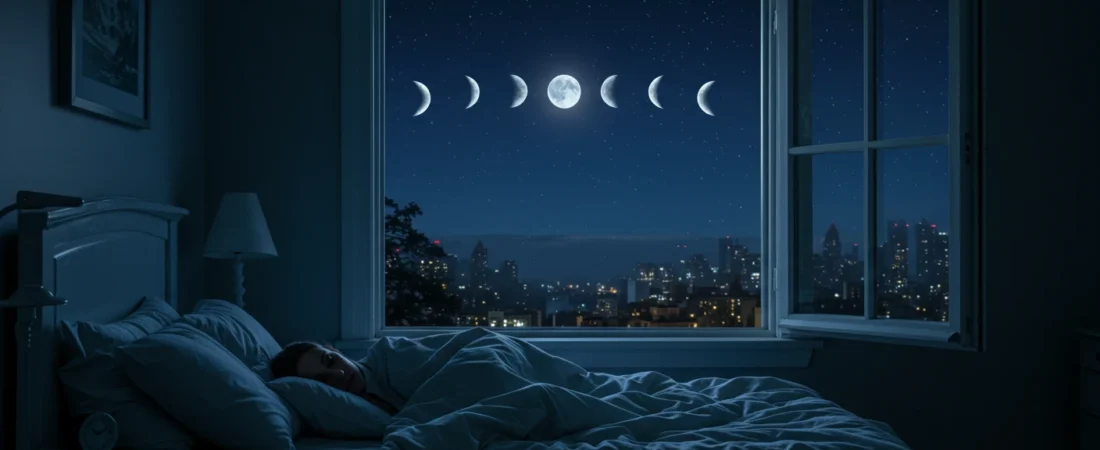Introduction
Lunar sleep syncing is an emerging wellness trend that aligns sleep patterns with the moon’s phases. Advocates suggest that syncing your sleep with lunar rhythms such as the full moon or new moon can lead to improved rest, emotional stability, and a deeper connection to nature. But does the moon really affect your sleep, or is it just a myth passed down by ancient traditions? Let’s explore the science and traditions behind lunar sleep syncing to discover how moon cycles might impact your health.
How Moon Cycles Affect Sleep: Science vs. Myth

Sleep researchers and traditional healers have long debated whether the moon has a measurable impact on human sleep. According to a 2013 study published in Current Biology, participants experienced reduced deep sleep and lower melatonin levels during the full moon even in a completely dark room and without knowing the moon phase (source).
Circadian Rhythms and Lunar Influence
Your circadian rhythm the internal biological clock regulating sleep and wake cycles can be influenced by light exposure. During a full moon, increased natural light may disrupt melatonin production, delaying sleep onset and affecting its quality. This disruption can mimic the effects of artificial light, throwing off your rhythm even without direct moonlight exposure.
New Moon and Restorative Sleep
Some proponents of lunar sleep syncing claim that sleep during the new moon is deeper and more rejuvenating. This belief aligns with ancient practices in Ayurveda and Traditional Chinese Medicine (TCM), which both emphasize the body’s heightened yin energy associated with rest during the darker lunar phase.
Lunar Sleep Syncing and Emotional Wellbeing

While sleep is often viewed through the lens of physical recovery, lunar sleep syncing introduces a deeper, more holistic perspective one that acknowledges the powerful relationship between lunar cycles and our emotional health. For centuries, cultures around the world have observed the moon not only as a timekeeper for tides and harvests, but also as a subtle influencer of human moods, dreams, and inner rhythms.
Emotional Sensitivity and the Full Moon
Many individuals report heightened emotional awareness or intense dreams around the time of the full moon. These experiences are not purely anecdotal. A study published in Translational Psychiatry suggested that people with bipolar disorder often experience mood fluctuations in sync with lunar phases, particularly during the full and new moons (source).
While the effects may be more noticeable in those with mood disorders, researchers propose that lunar influence might extend to the general population as well.
The Full Moon Effect on Mental Clarity and Rest
The full moon is traditionally associated with amplified energy, creativity, and even a sense of urgency. This lunar phase can increase brain activity and disrupt typical sleep patterns. Some people find themselves lying awake with racing thoughts, while others experience bursts of inspiration or vivid, surreal dreams. These fluctuations may lead to irritability or restlessness if not properly managed.
Practicing lunar sleep syncing during the full moon involves anticipating these emotional and mental peaks. To protect your peace and improve sleep quality, experts recommend reducing artificial lighting especially blue light from devices after sunset. Incorporating calming rituals such as herbal teas, warm baths, or sound meditation can help prepare your nervous system for restful sleep despite the full moon’s energetic pull.
“The full moon is a time of illumination externally and internally. When the moon shines bright, so do our emotions,” explains clinical psychologist Dr. Marla Deibler.
The Waning Moon: A Time for Release and Renewal
In contrast to the energizing effect of the full moon, the waning moon invites us to slow down. This phase, which follows the full moon, is characterized by a decrease in light and an energetic shift toward introspection. In the context of lunar sleep syncing, the waning phase offers an ideal opportunity to wind down emotionally and mentally.
Letting Go and Finding Balance
Just as the moon retreats into shadow, so can we release what no longer serves us. The waning moon supports emotional release, making it an excellent time to engage in restorative evening practices. Journaling can help you process lingering thoughts or emotions from the month. Gentle yoga, deep breathing, or guided sleep meditations are also powerful tools during this phase.
Syncing your sleep routine with the waning moon might include going to bed earlier, avoiding stimulating conversations late at night, or listening to soothing music before sleep. These intentional behaviors help transition your mind from external busyness to inner stillness.
Emotional Healing through Rhythm
Aligning with the moon’s decline can feel like a natural exhale after a period of heightened activity. For many, this alignment brings emotional clarity and a sense of closure. Lunar sleep syncing during the waning moon encourages self-reflection, self-care, and improved mental resilience over time.
According to the Sleep Health Foundation, mindfulness practices especially when paired with consistent sleep routines are effective in managing stress and enhancing sleep quality (source).
Circadian Rhythm and Moon Phases: Finding Balance With Lunar Sleep Syncing

Balancing your body’s circadian rhythm with lunar phases may sound mystical at first, but it’s rooted in both ancient wisdom and modern sleep science. While the sun provides a consistent 24-hour rhythm, the moon follows a roughly 29.5-day cycle, creating a fluctuating pattern of light and gravitational influence that subtly affects our bodies and minds. Understanding how your internal clock interacts with these moon phases is a key step toward effective lunar sleep syncing.
Why the Moon Matters for Circadian Health
Your circadian rhythm is essentially your body’s master clock, regulating sleep-wake cycles, hormone production, digestion, and even mood. It’s highly sensitive to external cues, primarily light and darkness. The moon, though less intense than the sun, introduces nuanced changes in nighttime light levels especially during its brighter phases like the full moon. These subtle shifts can impact melatonin production, the hormone responsible for signaling sleep.
Syncing with the Moon’s Calendar
To begin practicing lunar sleep syncing, you’ll first need to familiarize yourself with the moon’s phases. Several apps, such as Deluxe Moon, My Moon Phase, or Moon Calendar, make it easy to track lunar cycles and align your sleep patterns accordingly. Unlike rigid bedtime routines, syncing with the moon allows for a more intuitive, cyclical approach to rest supporting not only physical recovery but emotional and energetic balance.
“The light of the full moon may suppress melatonin secretion and delay sleep onset in sensitive individuals,” notes a 2013 study from Current Biology (source).
Practical Tips for Lunar Sleep Syncing
Each moon phase brings unique energy and light patterns, which can be harmonized with specific sleep strategies. Here’s how to apply lunar sleep syncing in your daily routine:
Full Moon: Calm the Energy
During the full moon, natural light levels peak, and many people report difficulty falling asleep or feeling more mentally active.
Tips:
- Avoid caffeine after noon.
- Reduce screen time at least two hours before bed.
- Use blackout curtains to minimize ambient moonlight.
- Practice calming rituals like breathwork or body scans.
New Moon: Set Intentions and Reset
With minimal light, the new moon symbolizes introspection and new beginnings. It’s an excellent time to establish healthier sleep habits.
Tips:
- Create or revisit sleep goals.
- Journal your intentions before bed.
- Go to bed 30 minutes earlier to maximize rest.
Waxing Moon: Build Momentum Gently
As the moon grows in brightness, energy often increases. This phase is ideal for gradually increasing activity but sleep routines should remain consistent.
Tips:
- Maintain steady bed and wake times.
- Add light evening movement like stretching.
- Limit stimulating content before bed.
Waning Moon: Reflect and Restore
This is a phase for winding down, letting go, and focusing on emotional decompression.
Tips:
- Incorporate meditation or gentle yoga.
- Take magnesium or calming herbal teas.
- Focus on low-stimulation environments in the evening.
The Sleep Foundation emphasizes that even when external cues like lunar light vary, maintaining a consistent sleep schedule leads to significantly improved sleep quality and overall wellbeing (source).
🌿 Final Thoughts: Should You Try Lunar Sleep Syncing?
While lunar sleep syncing isn’t a magic solution, it offers a natural rhythm to structure your evenings, enhance sleep hygiene, and align with ancestral wisdom. Whether you’re a night owl or early bird, tuning into lunar rhythms may improve not only how you sleep but how you feel.






